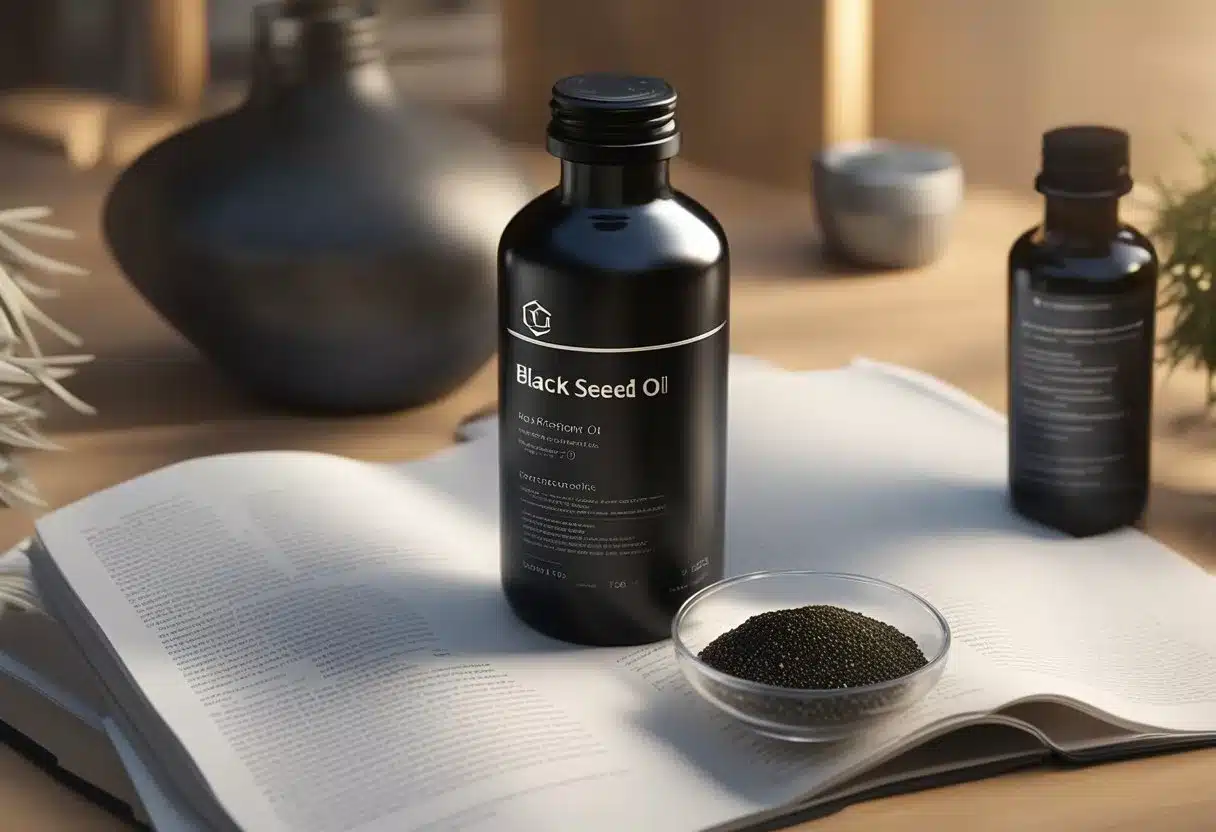Black seed oil has been used for centuries for its medicinal properties. Derived from the Nigella sativa plant, black seed oil is rich in antioxidants and has been associated with a wide range of health benefits. Its active compound, thymoquinone, is where much of the oil's therapeutic potential lies.
- Cold-pressed black seed oil softgel capsules: We source the wonderful plant nigella staiva from its natural home, capture it all in a 500mg capsule along with natural vitamin E (D-alpha Tocopherol) and manufacture it right here in the USA. The result is a superior-quality black cumin seed oil supplement that conveys all the benefits in an easy-to-swallow liquid capsule with no foul taste.
- Rediscover an ancient secret: Black seed oil (aka kalonji oil) has been used traditionally for thousands of years - as far back as the Egyptian pharaohs! Now, it's now seeing a resurgent boom in popularity and scientific interest. Pure, cold-pressed black seed oil in softgel form is hard to find in today’s market. Order your 60 day supply (1 bottle) of this ancient secret, and bring yourself the myriad benefits of this unique plant that’s taking the scientific world by storm!
Black seed oil is taken for its possible effects on immune health, inflammation, and various chronic conditions. While its usage is steeped in a long history of traditional medicine, particularly in Southeast Asia and the Middle East, modern science has begun to examine its efficacy.
This scrutiny brings forth both supporting evidence for its benefits and vital information regarding its safety, appropriate dosages, and potential side effects. The oil is considered safe for most people when used in moderation, but like all supplements, it is not free from potential adverse effects.
Key Takeaways
- Black seed oil, from Nigella sativa, is known for its antioxidants and potential health benefits.
- It is used for its possible impact on health conditions and immune support, primarily due to thymoquinone.
- While generally safe, appropriate usage guidelines should be followed to avoid potential side effects.
Origins and Composition

Black seed oil, derived from the Nigella sativa plant, is celebrated for its compelling nutritional profile and potential health benefits. Native to Southwest Asia and Africa, Nigella sativa has been used in traditional medicine for centuries. The oil's efficacy is largely attributed to the presence of thymoquinone, a potent antioxidant.
Nigella Sativa Plant
The Nigella sativa plant, also known as black cumin, is an annual flowering plant indigenous to Africa and Southwest Asia. Its seeds have been used in traditional medicine systems to treat various ailments. Modern research into black seed reveals that it is not only a staple in traditional healthcare practices but also a subject of interest for its therapeutic potentials in contemporary medicine.
Thymoquinone and Antioxidant Properties
The primary active compound in black seed oil is thymoquinone, which has demonstrated significant antioxidant properties. Antioxidants are crucial in protecting the body from the damaging effects of free radicals. Thymoquinone in black seed oil is known to modulate critical cellular pathways, helping to defend cells against oxidative stress and maintain the integrity of physiological processes.
Health Benefits

Black seed oil, derived from Nigella sativa, has been studied for its potential in treating a variety of health conditions. From supporting the immune system to addressing diabetes and skin conditions, the range of health benefits attributed to this oil is extensive.
Immune System Support
Research has shown that black seed oil may enhance the immune system's defenses. Its antimicrobial and antiviral properties help protect against infections, providing a natural boost to overall health.
Anti-Inflammatory Effects
The oil contains thymoquinone, an active compound that holds significant anti-inflammatory properties, potentially helping to alleviate symptoms of conditions like rheumatoid arthritis.
Impact on Blood Pressure and Heart Health
Clinical trials suggest that regular intake of black seed oil can lower high blood pressure and improve cholesterol levels, contributing to better heart health.
Diabetes and Blood Sugar Control
For those managing diabetes, black seed oil proves beneficial in controlling blood sugar levels. Its impact on glycemic control is specifically noteworthy for individuals with type 2 diabetes.
Weight Management and Obesity
Studies indicate that black seed oil might support weight loss efforts, particularly by reducing waist circumference among individuals with obesity.
Skin Conditions and Dermatological Benefits
Black seed oil has therapeutic effects on a variety of skin conditions, including eczema and psoriasis. Its medicinal properties aid in wound healing and improve overall skin health.
Gastrointestinal Health
With its anti-inflammatory benefits, the oil also promotes gastrointestinal health, reducing inflammation that can lead to a host of digestive issues.
Respiratory Conditions
The anti-inflammatory effect of black seed oil extends to respiratory conditions, where it can help alleviate symptoms of asthma and other breathing-related health conditions.
Cancer Fighting Potential
Thymoquinone, within black seed oil, has been linked to potential cancer-fighting abilities. This could make it an adjunct therapy in combating certain types of disease.
Reproductive Health
Advantages in reproductive health, particularly male infertility, have been observed with black seed oil, showing improvements in sperm count and motility.
Usage Guidelines

When approaching black seed oil, one must consider its diverse applications and the various forms in which it can be utilized. Adhering to recommended dosages and understanding the various preparations is crucial.
Recommended Dosages
The appropriate dosage of black seed oil may vary depending on one's age, health, and several other conditions. However, a typical daily dosage for adults is around 200 mg, as indicated in a clinical trial. Caution is advised to avoid overconsumption. It's imperative to follow specific dosing recommendations provided on product labels or by healthcare professionals.
Different Forms and Preparations
Black seed oil is available in multiple forms, including capsules, liquid oil, and as a herbal ingredient in various products. Capsules offer a convenient and measured option for those seeking to incorporate this oil into their daily regimen. As a massage oil, black seed oil is often diluted with carrier oils for topical application. Regardless of the form, it is essential to confirm the product's purity and quality.
Culinary Uses
In cooking, black seed oil derived from black caraway is used sparingly due to its potent flavor. It can be drizzled over salads, bread, or blended into smoothies. Cooking with this oil is not recommended as high heat may deteriorate its beneficial compounds. When used in culinary settings, it adds not only a unique flavor but also contributes to the dish's nutritional profile.
Potential Side Effects and Risks

While black seed oil is generally considered safe for most individuals, it's crucial to be aware of its potential side effects and risks, particularly when used inappropriately or by sensitive groups.
Common Adverse Reactions
Black seed oil can cause a variety of common adverse reactions, particularly when consumed in higher than recommended quantities. Some individuals may experience digestive issues such as nausea, vomiting, constipation, bloating, gas, and indigestion. Minor allergic reactions can also occur, manifesting as skin issues like an allergic rash.
Long-Term Use and Overconsumption
The risks associated with long-term use and overconsumption of black seed oil are not fully understood. However, chronic use has the potential to lead to more serious side effects. Overconsumption may exacerbate existing gastrointestinal issues and may lead to more severe adverse effects.
Special Populations and Contraindications
Certain special populations should exercise caution with the usage of black seed oil. It is not considered safe for pregnant or breastfeeding women due to insufficient research on its effects. Before surgery, patients should avoid black seed oil as it may act as a blood thinner, slowing clotting and increasing the risk of bleeding. Children and people with specific health conditions should consult a healthcare provider before use.
Interactions With Medications
Black seed oil may have interactions with medications, particularly those that treat hypertension, diabetes, and blood clotting. Medications such as amlodipine (a calcium channel blocker), warfarin (an anticoagulant), betamethasone (a steroid) and other immunosuppressants could interact with black seed oil, altering their effects. Patients on any form of medication should discuss with their healthcare provider to ensure safety and mitigate potential side effects.
Nutritional Supplement Information

Black seed oil supplements are renowned for their antimicrobial and antifungal properties, available in various forms such as capsules. Consumers often seek these supplements for their potential health benefits.
Black Seed Oil in the Market
Black seed oil is marketed as a dietary supplement and can be found in many health food stores and online platforms. The product typically comes in two main forms: liquid oil and softgel capsules. Liquid oils offer flexibility for dosing and might be preferred by those who are comfortable with its distinct taste. Capsules, on the other hand, provide a convenient and taste-neutral option. Here is a brief representation of the product types commonly found:
- Liquid Oil: Sold in bottles, varying in size from 1 oz to 16 oz.
- Capsules: Available in bottles containing a range from 60 to 180 capsules.
Quality and potency may vary widely among brands, making it crucial for consumers to choose products from reputable sources.
Certifications and Standards
When selecting a black seed oil supplement, certifications can offer guidance on quality. USDA-certified organic products assure consumers that the black seed oil has been produced through approved organic farming methods, free from synthetic pesticides and fertilizers. Here are key certifications that consumers might look for:
- USDA-certified Organic: Ensures the product is made from organic sources.
- GMP Certified: Indicates the product was manufactured following Good Manufacturing Practice regulations.
- Third-Party Testing: Offers independent verification that the supplement contains what it claims, without harmful levels of contaminants.
These certifications help ensure that the black seed oil supplements meet specific safety and quality standards before reaching consumers.
Evidence-Based Research

In examining the efficacy and safety of black seed oil, it is essential to reference peer-reviewed clinical studies and scientific research. These investigations provide insights into its potential health benefits for conditions such as diabetes and high blood pressure as well as its anti-inflammatory and antioxidant effects.
Clinical Studies and Trials
Diabetes: Clinical trials have indicated that black seed oil can have beneficial effects on blood sugar levels. For instance, research highlighted in the Overview of the human investigations of Nigella sativa (Black Seeds) demonstrates a lack of adverse effects and a potential for controlling blood glucose.
High Blood Pressure: Patients with hypertension may benefit from the regular consumption of black seed oil, as studies have suggested it can reduce elevated blood pressure. In these studies, the oil’s safety profile was carefully monitored, confirming its compatibility with human use when administered properly.
Scientific Perspectives
Anti-inflammatory Properties: The potent anti-inflammatory effects of black seed oil are well-documented. Scientific reviews like one found in the Overview of the preclinical pharmacological properties of Nigella sativa (black seeds) discuss its role in reducing inflammation, which is beneficial for numerous chronic conditions.
- Antioxidant Capacity: The powerful antioxidants in black seed oil provide a defense mechanism against oxidative stress, which can lead to chronic diseases. Studies have explored its capacity to balance free radical production with antioxidative defense systems, according to an article published in Evidence-based uses of standardized black seed oil.
By investigating these aspects, scientific research underscores the therapeutic implications of black seed oil while emphasizing the need for controlled clinical trials to confirm its efficacy and safety.
Comparative Analysis

This section offers an insightful comparative analysis of black seed oil, evaluating its effectiveness against other supplements and across various health conditions.
Black Seed Oil Versus Other Supplements
Black seed oil, derived from the Mediterranean's Nigella sativa plant, stands out for its distinctive blend of phytochemicals. Notably, it contains thymoquinone, which research suggests may harbor potent antioxidant and anti-inflammatory effects. Comparative studies have shown that black seed oil may offer unique advantages over certain conventional supplements, such as a stronger influence in modulating lipid profiles without significant side effects.
Other supplements may provide benefits like improved heart health or antioxidants, yet they often draw from a different active ingredient profile. For instance, fish oil is rich in omega-3 fatty acids, which differ from the thymoquinone found in black seed oil.
Effectiveness Across Different Health Conditions
Research into the comparative effectiveness of black seed oil across health conditions reveals a versatile profile. For example, studies have indicated support for black seed oil's impact in enhancing semen quality in infertile men, suggesting it may favorably compare with other fertility-enhancing supplements. Moreover, the oil's influence on lipid concentrations is notable, as it lacks the significant side effects sometimes associated with cholesterol-lowering medications. A meta-analysis underscored this, demonstrating how black seed oil supplementation did not yield adverse effects commonly seen with some pharmaceutical interventions.
In contrast, the effectiveness of black seed oil in other health areas may be comparable or less pronounced when set against specialized supplements. For instance, while its antibacterial properties are acknowledged, certain targeted antibiotic treatments may exhibit superior efficacy against specific pathogens.
Frequently Asked Questions

In this section, commonly asked questions about black seed oil are addressed, shedding light on its benefits and potential side effects, tailored to males and females alike, as well as usage guidelines.
What are the potential health benefits of taking black seed oil for males?
Black seed oil has been linked to several health benefits for men, including enhancing fertility, boosting the immune system, and potentially improving cardiovascular health. Research indicates that it may also aid in balancing blood sugar levels.
Can women experience specific health benefits from using black seed oil?
For women, black seed oil is believed to offer a range of health benefits such as hormonal balance support and possible relief from menstrual discomfort. It is also used for skin health, often being credited for its hydrating and anti-inflammatory properties.
Are there any known side effects associated with long-term use of black seed oil?
Long-term use of black seed oil could lead to minor side effects including digestive issues like bloating, gas, or constipation. It is advised to monitor usage carefully and seek medical advice for guidance.
How should black seed oil be administered for optimal health benefits?
Black seed oil should be administered as recommended by a healthcare professional or as directed on product labeling. It can be consumed directly, added to food, or applied topically, depending on the intended use.
What is the most effective time of day to consume black seed oil?
The most effective time of day to consume black seed oil may vary based on individual health goals and preferences. However, some suggest taking it before meals or bed to maximize absorption and effectiveness.
After beginning supplementation, how long does it typically take to notice the effects of black seed oil?
The duration before noticing the effects of black seed oil supplementation can vary. Some individuals may observe changes within a few weeks.
Consistency in usage is crucial for the benefits to manifest.